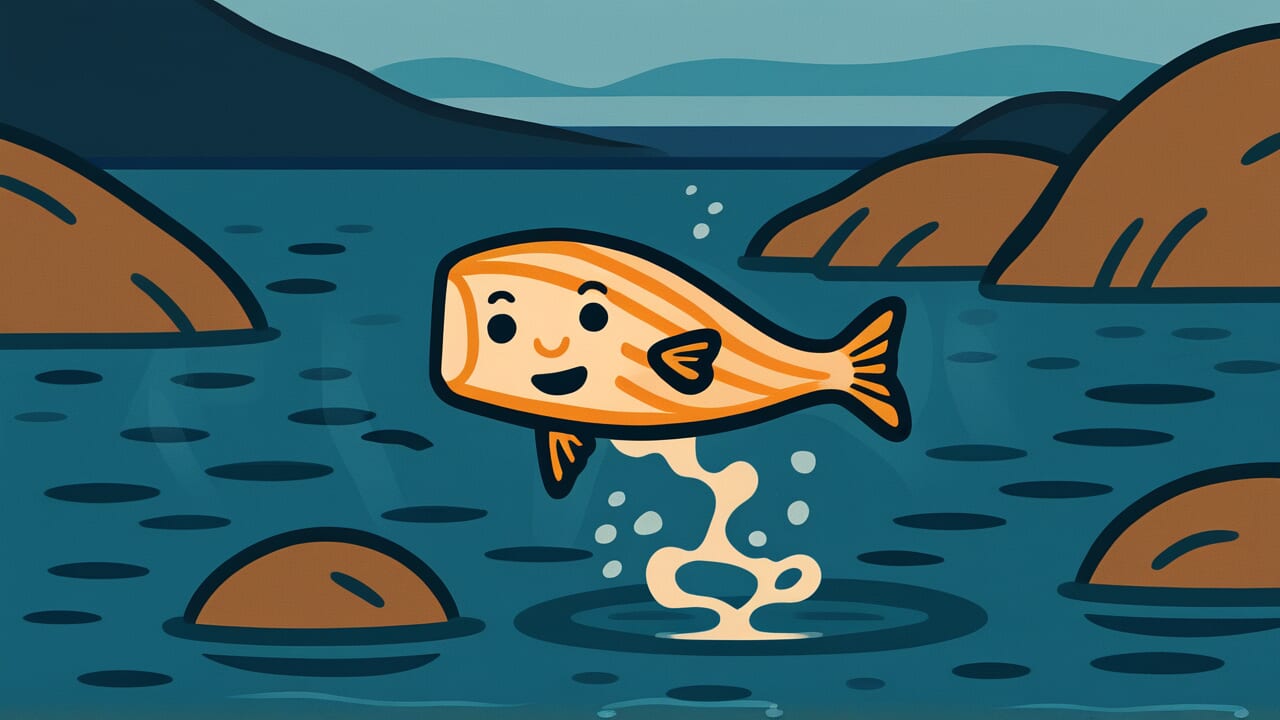How to Read “A dried fish cries when crossing a river”
Kogyo kawa o sugite naku
Meaning of “A dried fish cries when crossing a river”
“A dried fish cries when crossing a river” means it’s too late to ask for help when you’re already in desperate circumstances.
Just like a dried fish can’t return to water even when it’s near a river, crying out after missing the right moment to act is useless.
This proverb teaches that you should take action before reaching a crisis point.
People use this saying when someone fails to act early and ends up in an irreversible situation.
It emphasizes the importance of timing when asking for help and the need for early response.
Today, we use it when someone delays dealing with problems until they become serious.
It especially applies when people hesitate to ask for help or try to handle everything alone, making things worse.
The proverb fits situations where failures could have been prevented with earlier action.
Origin and Etymology
This proverb likely comes from a parable in the ancient Chinese text “Zhuangzi.”
In the story, a dried fish meets Zhuangzi and begs for help.
The fish says, “I am a subject of the Eastern Sea waves. Just one cup of water would save my life.”
Zhuangzi replies, “I understand. I’ll meet the southern king and bring water from the great river.”
But the fish responds sadly, “That won’t be in time. You’ll have to look for me at the dried fish shop.”
This parable traveled to Japan and evolved into “A dried fish cries when crossing a river.”
The phrase “crossing a river” expresses missing the critical moment before help arrives.
For a dried fish, even if a river flows right in front of it, it can no longer return to that water.
The proverb contains a painful lesson: regret after it’s too late is meaningless.
Zhuangzi’s original parable taught the importance of immediate, practical help.
As Japan adopted this story, it evolved into a more universal lesson about “regret after missing your chance.”
Usage Examples
- You should have consulted someone when cash flow got tight. Asking for help on the verge of bankruptcy is like a dried fish cries when crossing a river.
- Ignoring poor health until it becomes serious, then rushing to the hospital—that’s exactly a dried fish cries when crossing a river.
Universal Wisdom
“A dried fish cries when crossing a river” perfectly captures a fundamental human weakness.
That weakness is our inability to act until crisis is right in front of us.
Why can’t we deal with problems while they’re still small?
It’s because we fear changing the current situation. We have pride that prevents showing weakness to others.
We also have baseless optimism that tells us “it’s still okay.”
Asking for help feels like admitting our own powerlessness.
This proverb has been passed down through generations because so many people have repeated this mistake.
We say people learn from experience, but actually we repeat the same failures over and over.
The pain of facing a problem now feels heavier than the greater pain that will come later.
The truth this proverb reveals is the importance of timing.
The same help can save you if you seek it early, but becomes meaningless if you wait too long.
Many of life’s tragedies don’t come from lack of action itself, but from acting at the wrong time.
Our ancestors deeply understood the cruelty of this element called time.
When AI Hears This
When you view a fish drying out through information theory, a surprisingly precise structure emerges.
Inside a living fish’s body, water molecules are arranged in exquisite balance through cell membranes.
This “ordered state” is low entropy—a state with high information content.
But the moment the fish leaves water, this order begins to collapse.
Water molecules evaporate randomly, proteins denature, and cell structures break down irreversibly.
What’s crucial here is that this process is completely one-way.
Just like you can’t unbreak an egg, returning a system with increased entropy to its original low-entropy state requires enormous external energy and information.
A dried fish won’t come back to life even if you put it in water because too much information has been lost.
The arrangement of cell membranes, the three-dimensional structure of enzymes, the connection patterns of neural circuits—all this vast information has dissipated as heat.
The essence of this proverb shows the critical point of information loss over time.
Before the fish crossed the river, the system’s order was still maintained.
But the moment it passed the critical point, the cost of restoring that information skyrocketed astronomically.
The act of crying represents the moment of recognizing the value of lost information while realizing that physical laws make it forever irretrievable.
The death of information, like the death of an organism, is irreversible.
Lessons for Today
This proverb teaches modern people the importance of “courage to ask for help.”
Modern society emphasizes personal responsibility, creating an atmosphere where showing weakness is shameful.
But isn’t true strength about recognizing your limits and seeking support at the right time?
“Early detection” and “early response” to problems are especially important.
Getting health checkups, keeping a household budget, regularly reflecting on relationships—these routine checks seem mundane but are vital habits.
They help you notice crises before they become serious.
Building trusting relationships with people around you in daily life is also crucial.
Relationships where you can ask for help in emergencies can’t be created overnight.
Nurturing mutually supportive relationships becomes your own safety net.
The words “it’s still okay” can sometimes be the most dangerous self-deception.
Don’t overlook small discomforts. Act early.
That’s the wisdom for not becoming a dried fish.
In your life, have the courage to move before it’s too late.



Comments